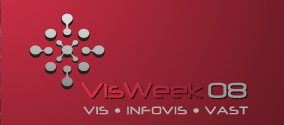Sessions » Panels
Grand Challenges for Information Visualization
Panelists: Georges Grinstein, Daniel Keim, Tamara Munzner
This panel will address the state of information visualization by providing a very brief history of the milestones. Various definitions of what a grand challenge is will be discussed. The results of the informal (not statistically valid) poll held to define and evolve a set of grand problems and challenges for information visualization will be presented. Well over 200 visualization researchers were contacted. This resulted in an overwhelming response with many enthused about the activity. The results have been sifted through, collated, organized, prioritized and summarized. The previously published visualization research challenges have also been organized and summarized.
Building a Research Group in Visualization
Panelists: Hamish Carr, Sheelagh Carpendale, Thomas Ertl, Helwig Hauser, Chris Johnson, Min Chen, Stephen North
Visualization is an interdisciplinary field heavily reliant on science, engineering, medicine, economics and software development for inspiration, data and collaboration, while these domains increasingly depend on visualization to support their own activities. Since visualization involves multiple fields of competence, it is difficult to do this on a small scale, leading to a need for research groups in visualization, which in turn opens up career opportunities for recent visualization graduates in academia and in industry.
The Interdisciplinary Science of Visual Analytics
Panelists: Brian Fisher, David Ebert, Wayne Gray, Ronald Rensink, William Ribarsky
Visual Analytics is inherently interdisciplinary, combining
cognitive science, computer science, mathematics and graphical and
interaction design. This panel will advance the dialog between
researchers in the visualization community and those from the
cognitive sciences. The goal of the discussion is to better illuminate
the path towards a (possibly new) cognitive science of analytical
reasoning with the interactive visual interface. This new science will
have strong bidirectional links with the design and evaluation of
interactive visualization technologies. The panel will explore the
ways in which an application-driven cognitive science can be informed
and directed by specific requirements of visual analytics technology,
users, designers and other stakeholders. Our goal is a science that is
grounded in real-world tasks and stimuli, that makes strong
predictions about human cognitive performance with visual analytics
technologies.






 Week-at-a-Glance
Week-at-a-Glance

